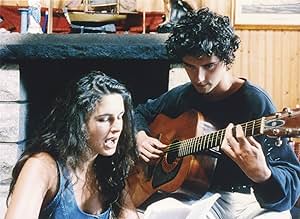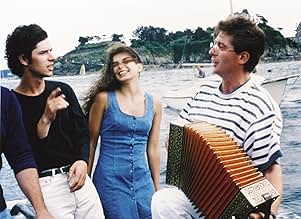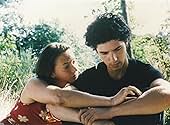VALUTAZIONE IMDb
7,6/10
11.296
LA TUA VALUTAZIONE
Un laureato in matematica fa una vacanza a Dinard prima di iniziare il suo primo lavoro. Spera che la sua ragazza si unisca a lui, ma presto stringe amicizia con un'altra donna che lavora in... Leggi tuttoUn laureato in matematica fa una vacanza a Dinard prima di iniziare il suo primo lavoro. Spera che la sua ragazza si unisca a lui, ma presto stringe amicizia con un'altra donna che lavora in città.Un laureato in matematica fa una vacanza a Dinard prima di iniziare il suo primo lavoro. Spera che la sua ragazza si unisca a lui, ma presto stringe amicizia con un'altra donna che lavora in città.
- Regia
- Sceneggiatura
- Star
- Premi
- 1 candidatura in totale
Recensioni in evidenza
10aileigc
I'd say this film is an essay, regarding shyness, relations with the opposite sex, friendship and love. Being only based on the dialogues between different people, it's full of substance, and will definitely ask the viewer to think on the matter. I liked it so much because the people were real, the problem was real. Lots of people suffer problems of integration and self-achievement next to others and these have been thoroughly dealt with in the film.
Its main problems are how much is worth a summer romance next to a sincere friendship, and the importance of knowing exactly one's feelings and purposes (do I love her, or do I not ? Am I merely trying to have fun?).
In the end, we are faced with a line addressed to the main character that we can take for ourselves: "it was your own choice, think about it".
That's the main message: the director presents a problem, the dialogues delve deeply in several of its aspects but the conclusion of why things turned out as they did is left to us. In short, the viewer will certainly learn something from it, and that can even lead to deeper self-reflections on one's personal life. A valuable film, and an interesting lesson. Especially good for young people afraid of not finding that special one.
Its main problems are how much is worth a summer romance next to a sincere friendship, and the importance of knowing exactly one's feelings and purposes (do I love her, or do I not ? Am I merely trying to have fun?).
In the end, we are faced with a line addressed to the main character that we can take for ourselves: "it was your own choice, think about it".
That's the main message: the director presents a problem, the dialogues delve deeply in several of its aspects but the conclusion of why things turned out as they did is left to us. In short, the viewer will certainly learn something from it, and that can even lead to deeper self-reflections on one's personal life. A valuable film, and an interesting lesson. Especially good for young people afraid of not finding that special one.
I couldn't agree more with the previous commenter from Germany in that we are so accustomed to dialogue and plot coming from Hollywood that when something this thoughtful and pure comes along, it just blows us away. I love the way Rohmer slowly guides the audience into the film, without a need for narration, only the sights and sounds of Brittany. When the first words of dialogue begin, it is so natural, but says so much about the characters. "I don't want to plan my life around money", Gaspard tells Margot, and you see him go through a process of writing his sea shantey, a really great little piece of music if you ask me. And to see a five minutes scene with Gaspard and Solene actually singing the song was just riveting. How does rohmer make something so banal on the surface so climactic? On paper, his stories and his characters don't really seem that interesting, but he adds something to them that make them resonate so deeply in me, and I am almost awestruck when it happens.
The great thing is that I can say that for almost all of Rohmer's films, especially those that make up the "Tales of the Four Seasons" I can't say I have a favorite because things like favorite or top films just go against the grain of what Rohmer is doing. I read somewhere that Rohmer has never made a masterpiece, in fact, he's never even attempted to. and yet, each character he's given us, Jeanne, Natascha and Igor from Spring, Gaspard and Margot from Summer, Isabelle, Magali, Gerard and Rosine from Autumn, and Felicie and Charles from Winter, are drawn so vividly that I sometimes forget that they are only characters and not people I call as personal friends.
In addition, I'd like to add that Amanda Langlet's characters seem to be the only "pure" characters in any of Rohmer's films, both as Pauline and Margot, She is beautiful, kind, intelligent, honest.....whereas his other characters, though likable and sympathetic, all have certain flaws.., some tell lies, some are neurotic, some judgemental, deceitful..self-indulgent, capricious.., so forth.
The great thing is that I can say that for almost all of Rohmer's films, especially those that make up the "Tales of the Four Seasons" I can't say I have a favorite because things like favorite or top films just go against the grain of what Rohmer is doing. I read somewhere that Rohmer has never made a masterpiece, in fact, he's never even attempted to. and yet, each character he's given us, Jeanne, Natascha and Igor from Spring, Gaspard and Margot from Summer, Isabelle, Magali, Gerard and Rosine from Autumn, and Felicie and Charles from Winter, are drawn so vividly that I sometimes forget that they are only characters and not people I call as personal friends.
In addition, I'd like to add that Amanda Langlet's characters seem to be the only "pure" characters in any of Rohmer's films, both as Pauline and Margot, She is beautiful, kind, intelligent, honest.....whereas his other characters, though likable and sympathetic, all have certain flaws.., some tell lies, some are neurotic, some judgemental, deceitful..self-indulgent, capricious.., so forth.
One of Rohmer's best. Gaspard (Melvil Poupaud) takes a month long vacation to a beach in Normandy, waiting for his more or less official girlfriend, the somewhat snotty Lena (Aurelia Nolin), to come. While waiting for her, he befriends the waitress and aspiring anthropologist Margot (Rohmer regular Amanda Langlet). Eventually, a relationship between the two develops, which seems to consists almost exclusively of long talks in the beach. But this is not all, since he soon also meets the somewhat promiscuous (but "principled") Solene (Gwaenelle Simon) in a disco. When Lena finally arrives to the resort, more than halfway into the movie, he finally finds himself in the position of having to choose one of the three. Rohmer would want us to think that Margot would be the best choice, and is difficult to disagree, since she's so charming and so willing to listen to him and even put up with him. It's amazing how Rohmer (who was in his late 70s when he directed this) is able to portray realistically how young people talk and interact. The final decision by Gaspard was a bit of a disappointment, but it was probably the more realistic possibility.
Eric Rohmer's characters are mostly intellectuals, and mostly not so bright. On one hand, this is to Rohmer's credit, since it's realistic; on the other hand, the rarer characters with more penetrating intelligence (as in, especially, "My Night at Maude's") are nicer to listen to. Rohmer's characters love to yak on about ideas, art, and their feelings. The talk, on the most literal level, is generally unpersuasive, but relationships are formed through enjoyment of conversation, and character (not limited to vanity) is revealed via defensiveness and posturing.
"A Summer's Tale" follows twenty-something Gaspard during his summer vacation at a seaside resort town in Brittany. The people in the movie have fewer blind spots than most Rohmer characters, but not fewer difficulties. For a theme song, I'd suggest Weird Al Yankovic's "Good Enough For Now." The girl Gaspard had planned to meet alternately blows him off and strings him along. Another girl he meets, with whom there is palpable chemistry, has a distant boyfriend she doesn't seem very attached to. He vacillates on a third he is not crazy about but who bluntly conveys that she would take him. Gaspard is turned down twice for a romantic relationship (though not told to get lost entirely), and does the turning down once.
The interactions exhibit a believable mixture of genuine affection, indecision, and awkwardness. Rough edges are not glossed over as they might be by romanticism or in recollection. These might have been ingredients for a dull virtuous accuracy. But "A Summer's Tale" moves at a good pace, turns in the story feel natural and mostly not inevitable, and the whole is affecting and memorable.
"A Summer's Tale" follows twenty-something Gaspard during his summer vacation at a seaside resort town in Brittany. The people in the movie have fewer blind spots than most Rohmer characters, but not fewer difficulties. For a theme song, I'd suggest Weird Al Yankovic's "Good Enough For Now." The girl Gaspard had planned to meet alternately blows him off and strings him along. Another girl he meets, with whom there is palpable chemistry, has a distant boyfriend she doesn't seem very attached to. He vacillates on a third he is not crazy about but who bluntly conveys that she would take him. Gaspard is turned down twice for a romantic relationship (though not told to get lost entirely), and does the turning down once.
The interactions exhibit a believable mixture of genuine affection, indecision, and awkwardness. Rough edges are not glossed over as they might be by romanticism or in recollection. These might have been ingredients for a dull virtuous accuracy. But "A Summer's Tale" moves at a good pace, turns in the story feel natural and mostly not inevitable, and the whole is affecting and memorable.
Gaspard, played by Melvil Poupaud, is a song writer, a good-looking but
dull young man, a gauche loner with a flat voice and an inexpressive
face who comes to this delightful holiday island of Dinard off the
Brittany coast to await the arrival of his `sort-of' girl friend, who
demonstrates how much she loves him by keeping him waiting for two
weeks. During those two weeks, however, he finds two other girl friends
anything else. First he is picked up in a restaurant by Margot, a
waitress, who turns out not to be a waitress but an Ethnologist, just
helping out her aunt who owns the restaurant. Obviously such a bright
and intelligent girl could not be merely working-class!
Amanda Langlet, who plays Margot and who appeared ten years earlier in
Rohmer's `Pauline at the Beach.' is clearly the star of this film. Much
of the enjoyment of the film is derived from being in the company of
this vivacious girl and being allowed to eavesdrop on her talk with
Gaspard about love and relationships as they roam in the bright sunlight
around this lovely French sea-side resort and the countryside beyond.
She is such a very warm and sympathetic listener that it is difficult to
understand why he doesn't fall in love with her. Why she doesn't fall in
love with him is easier to understand. (you ask yourself; is this man a
very good actor or a very bad one?) He makes a couple of inept attempts
to move the relationship forward but is repulsed; she wants only
friendship - and you feel he is lucky to get that - while she awaits the
return of her Anthropologist boy-friend who is away in South America.
Gaspard's dullness is made obvious when she takes him to hear an old
sailor sing sea-shanties; her face so eager and enrapt as she listens
intently; his face, alongside, so lifeless.
She encourages him to take up with Solene, played by Gwenaelle Simon in
her first film, a friend of her's who they meet at a dance, but when he
does, she is jealous, jealous of their friendship she says but secretly
hurt that he now thinks of her as only a friend.
His relationship with Solene seems idyllic at first, they seem
marvelously happy and well suited to each other. He is accepted warmly
into her family, they all go sailing together and have a merry
sing-a-long to one of his songs. But then, sadly, her true nature shows;
she becomes aggressive and demanding, insisting that he take her to the
island of Quessant or their relationship is at an end. And now Lena, his
`sort-of' girl friend, played by Aurelia Nolin, appears and insists that
he take her instead. He must now choose.
Rohmer's films are never plot-dependent; he prefers to dwell on the
characters, to bring us into a close, intimate relation with them, while
they reveal themselves in talk. And when the characters are as
attractive as Margot
dull young man, a gauche loner with a flat voice and an inexpressive
face who comes to this delightful holiday island of Dinard off the
Brittany coast to await the arrival of his `sort-of' girl friend, who
demonstrates how much she loves him by keeping him waiting for two
weeks. During those two weeks, however, he finds two other girl friends
- or rather they find him. It must be his good-looks, it can't be
anything else. First he is picked up in a restaurant by Margot, a
waitress, who turns out not to be a waitress but an Ethnologist, just
helping out her aunt who owns the restaurant. Obviously such a bright
and intelligent girl could not be merely working-class!
Amanda Langlet, who plays Margot and who appeared ten years earlier in
Rohmer's `Pauline at the Beach.' is clearly the star of this film. Much
of the enjoyment of the film is derived from being in the company of
this vivacious girl and being allowed to eavesdrop on her talk with
Gaspard about love and relationships as they roam in the bright sunlight
around this lovely French sea-side resort and the countryside beyond.
She is such a very warm and sympathetic listener that it is difficult to
understand why he doesn't fall in love with her. Why she doesn't fall in
love with him is easier to understand. (you ask yourself; is this man a
very good actor or a very bad one?) He makes a couple of inept attempts
to move the relationship forward but is repulsed; she wants only
friendship - and you feel he is lucky to get that - while she awaits the
return of her Anthropologist boy-friend who is away in South America.
Gaspard's dullness is made obvious when she takes him to hear an old
sailor sing sea-shanties; her face so eager and enrapt as she listens
intently; his face, alongside, so lifeless.
She encourages him to take up with Solene, played by Gwenaelle Simon in
her first film, a friend of her's who they meet at a dance, but when he
does, she is jealous, jealous of their friendship she says but secretly
hurt that he now thinks of her as only a friend.
His relationship with Solene seems idyllic at first, they seem
marvelously happy and well suited to each other. He is accepted warmly
into her family, they all go sailing together and have a merry
sing-a-long to one of his songs. But then, sadly, her true nature shows;
she becomes aggressive and demanding, insisting that he take her to the
island of Quessant or their relationship is at an end. And now Lena, his
`sort-of' girl friend, played by Aurelia Nolin, appears and insists that
he take her instead. He must now choose.
Rohmer's films are never plot-dependent; he prefers to dwell on the
characters, to bring us into a close, intimate relation with them, while
they reveal themselves in talk. And when the characters are as
attractive as Margot
Lo sapevi?
- QuizThis is, perhaps, the film in which Rohmer - notoriously silent about his private life - came closest to autobiography, filling the story with discrete traces and allusions to his own past. "Of all the films I've made, I think this is the most personal vehicle. Everything that is in this film is true. They are either things that I experienced in my youth or things that I noticed. [...] I have carried with me the story of this film, which was in part inspired by events that occurred during my adolescence, for a long time."
- Antoine de Baecque & Noël Herpe, "Éric Rohmer: A Biography" (New York: Columbia University Press, 2016), p. 458.
- ConnessioniFeatured in The Movie Show: Episodio datato 16 aprile 1997 (1997)
- Colonne sonoreFille de corsaire
Performed by Sebastien Erms
I più visti
Accedi per valutare e creare un elenco di titoli salvati per ottenere consigli personalizzati
- How long is A Summer's Tale?Powered by Alexa
Dettagli
- Data di uscita
- Paese di origine
- Lingua
- Celebre anche come
- Racconto d'estate
- Luoghi delle riprese
- Rue de la Malouine, Dinard, Ille-et-Vilaine, Francia(Solene's cousins house)
- Aziende produttrici
- Vedi altri crediti dell’azienda su IMDbPro
Botteghino
- Lordo Stati Uniti e Canada
- 198.126 USD
- Fine settimana di apertura Stati Uniti e Canada
- 12.863 USD
- 22 giu 2014
- Lordo in tutto il mondo
- 198.706 USD
- Tempo di esecuzione
- 1h 53min(113 min)
- Colore
- Mix di suoni
Contribuisci a questa pagina
Suggerisci una modifica o aggiungi i contenuti mancanti






















